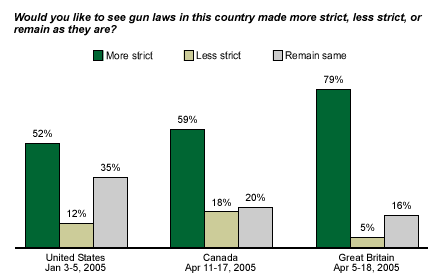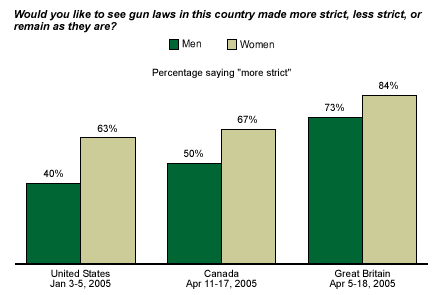Mae West said, "Too much of a good thing can be wonderful." When it comes to gun laws, some argue vehemently as to whether stricter laws are, in fact, "a good thing." But in Great Britain, which has some of the most stringent gun laws in the world, citizens are ready for more.
According to recent multinational Gallup polling* in the United States, Britain, and Canada, roughly 8 in 10 British adults (79%) feel gun laws should be stricter. This percentage is significantly lower in both Canada and the United States, where 59% and 52%, respectively, want tougher laws. Canadians and Americans are also more likely than Britons to desire "less strict" gun laws: 18% of Canadians and 12% of Americans, compared with 5% of Britons.

Gun laws in Great Britain are already significantly stricter than those in Canada and the United States. After the 1996 school massacre in Dunblane, Scotland, Britain banned all handguns. According to the British Home Office, the 2003 Gun Amnesty resulted in 44,000 guns and more than a million rounds of ammunition being turned over to the authorities.
Even before these amendments, the number of registered guns in Britain was low: At the end of 1995, 174,000 firearm certificates and 723,000 shotgun certificates were on file. As reported by the Senior Experts Group on Transnational Organized Crime, these covered approximately 409,000 firearms and 1,297,000 shotguns. The total number of handguns and shotguns increased by less than 10,000 firearms between 1995 and 2004.
However, the issue of gun laws has resurfaced lately, which may be driving public opinion. Because of a soaring increase in the use of "replica" guns -- look-alike weapons that can be converted to fire live ammunition -- new laws are being proposed in Great Britain to ban the manufacture, import, and sale of these weapons.
Canada's laws are not as stringent as those in Britain, but they are much stricter than those in the United States -- and became even stricter in 2003. Many types of guns, including replicas, are prohibited or restricted. All non-restricted firearms must be licensed and registered and failure to do so may now result in significant prison time.
America: Gun Ho
Of all three countries, the United States has the least strict gun laws and it is the only country in which bearing arms is a constitutional right (though the extent of that right is often a matter of debate). The United States' unique culture of gun ownership likely leads fewer Americans than Canadians or Britons to favor stricter gun laws -- although a slim majority wants tougher laws.
Gun ownership is far more common in the United States than in either Canada or Great Britain. Based on the most recent population information for each nation, and licensing figures, the United States has a higher gun-per-capita rate than Canada or Great Britain: 73% as compared with 22% in Canada and a meager 3% in Great Britain.
Gender and Guns
In all three countries, sentiments toward stricter gun laws don't vary much along demographic lines -- except by gender. In the United States, Canada, and Great Britain, women are more likely than men to favor stricter gun laws.
In the United States, 63% of women favor stricter laws, as opposed to 40% of men. In Canada, the corresponding figures are 67% of women and 50% of men. In Great Britain, the gap between male and female sentiments on the topic is smaller; 84% of British women and 73% of British men want stricter gun laws.
While the female inclination toward stricter gun laws could stem from a variety of factors, it is interesting to note that, according to past poll data, women in all three countries are significantly more likely than men to think the nationwide crime problem is extremely or very serious.

Future of Firearm Laws in Britain
The rate of violent crime in Britain has fallen overall since 1995, but between the 1998 and 2002/2003 British Crime Surveys, incidents involving a weapon increased significantly. Although private ownership of handguns is prohibited, the sale of replica guns is on the rise -- the BBC reported that last year alone, offenses involving replica guns grew 66%.
Despite the prohibition of handguns and the relatively low incidence of gun violence in Britain, the British government continues to make its gun laws stricter -- largely as result of the changing face of crime and continued public sentiment toward tougher laws. The same trend is far less likely in Canada or the United States, where residents are more divided on how strict laws need to be.
*Results in the United States are based on telephone interviews with and 1,005 national adults, aged 18 and older, conducted Jan. 3-5, 2005. For results based on the total sample of national adults, one can say with 95% confidence that the maximum margin of sampling error is ±3 percentage points. The survey was conducted by Gallup USA.
Results in Canada are based on telephone interviews with 1,006 national adults, aged 18 and older, conducted April 11-17, 2005. For results based on the total sample of national adults, one can say with 95% confidence that the maximum margin of sampling error is ±3 percentage points. The survey was conducted by Gallup Canada.
Results in Great Britain are based on telephone interviews with 1,012 national adults, aged 18 and older, conducted April 5-18, 2005. For results based on the total sample of national adults, one can say with 95% confidence that the maximum margin of sampling error is ±3 percentage points. The survey was conducted by Gallup UK.
In addition to sampling error, question wording and practical difficulties in conducting surveys can introduce error or bias into the findings of public opinion polls.
